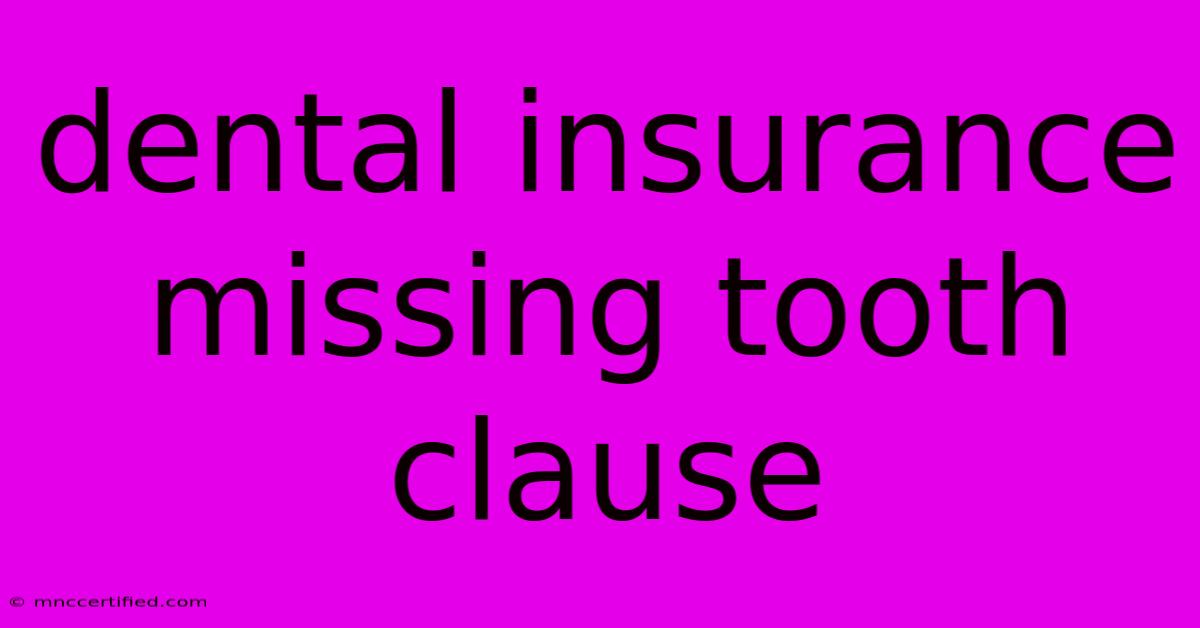Dental Insurance Missing Tooth Clause

Table of Contents
Understanding the Missing Tooth Clause in Dental Insurance
Dental insurance can be a lifesaver, but it's important to understand the fine print to ensure you're covered when you need it most. One particularly important clause to be aware of is the missing tooth clause. This clause outlines how your dental insurance handles the replacement of missing teeth, and it can vary significantly between insurance providers.
What is the Missing Tooth Clause?
The missing tooth clause, also known as the "pre-existing condition" clause, typically states that your insurance won't cover the replacement of a tooth that was missing before your policy's effective date. This means if you lost a tooth before you enrolled in the plan, the insurance company will likely consider it a pre-existing condition and won't cover the cost of implants, bridges, dentures, or other replacement options.
Why Does the Missing Tooth Clause Exist?
Insurance companies implement these clauses to prevent adverse selection. This refers to the tendency of people with higher healthcare needs (like those with missing teeth) to be more likely to purchase insurance, thus potentially draining the insurance pool's resources.
Common Scenarios and Exclusions
While specific coverage varies by insurance provider, here are some common scenarios and exclusions related to the missing tooth clause:
- Pre-existing Loss: As mentioned, if a tooth was missing before your coverage started, you're likely not covered for replacement.
- Accidental Loss: If you lose a tooth due to an accident after your policy begins, your coverage might apply, depending on the specifics of your plan.
- Extractions: If you need an extraction due to a dental issue, your insurance might cover the procedure, but not the tooth replacement.
What to Do if You Have a Missing Tooth
- Read Your Policy: Carefully review your dental insurance policy to understand the exact terms of your missing tooth clause.
- Ask Questions: Contact your insurance provider directly and inquire about their coverage for replacing missing teeth.
- Consider Coverage Options: If you're planning to get dental work, especially tooth replacement, consider changing your insurance plan or upgrading to a more comprehensive policy that might offer better coverage for pre-existing conditions.
- Negotiate with Your Dentist: Your dentist might be able to work with you on payment options or negotiate with your insurance provider on your behalf.
Choosing the Right Dental Insurance
When selecting a dental insurance plan, pay close attention to the missing tooth clause and other relevant terms:
- Coverage Levels: Some plans offer higher coverage limits or more comprehensive benefits, which can affect how much you pay out of pocket for tooth replacement.
- Waiting Periods: Many plans have waiting periods before certain procedures, like implants, are covered.
- Exclusions: Carefully review any exclusions or limitations in the policy, such as specific procedures or materials not covered.
Understanding the missing tooth clause is crucial for protecting your finances and ensuring you have the right coverage to maintain a healthy smile. By carefully reading your policy and asking questions, you can navigate this complex aspect of dental insurance and make informed decisions about your dental care.

Thank you for visiting our website wich cover about Dental Insurance Missing Tooth Clause. We hope the information provided has been useful to you. Feel free to contact us if you have any questions or need further assistance. See you next time and dont miss to bookmark.
Featured Posts
-
Atlantic Coast Login Health Insurance
Nov 10, 2024
-
Homeowners Insurance New Braunfels Tx
Nov 10, 2024
-
Colorado Vs Texas Tech Football Live Stream
Nov 10, 2024
-
Does Health Insurance Cover Nose Jobs
Nov 10, 2024
-
Where To Stream Ohio State Vs Purdue Game
Nov 10, 2024